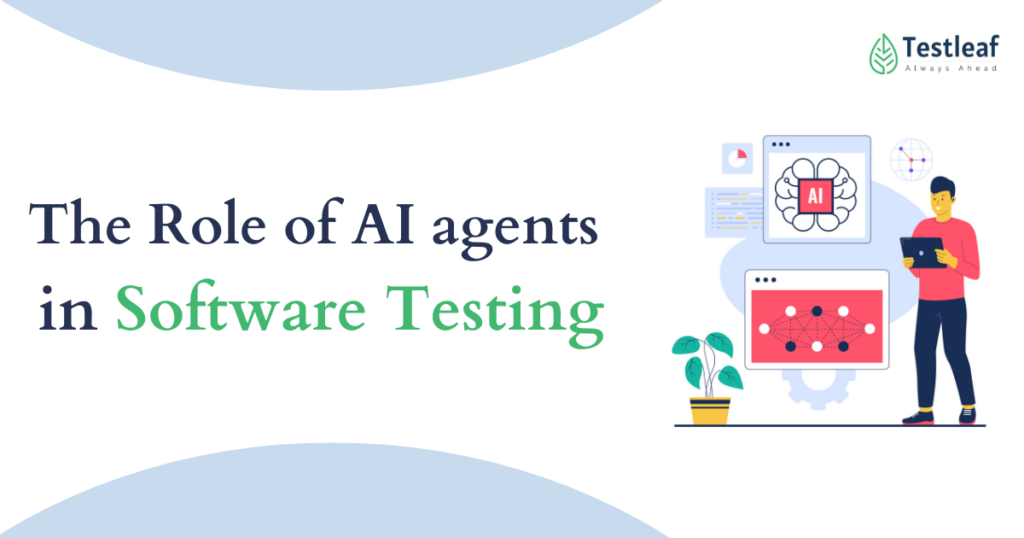Introduction
Software testing is a crucial step in the software development lifecycle, ensuring the quality, performance, and reliability of applications before they reach end users.
Traditionally, software testing has been a labor-intensive process requiring significant human effort to design, execute, and maintain test cases. However, with the rapid advancement of Artificial Intelligence (AI), AI agents are now transforming the landscape of software testing, making it more efficient, accurate, and scalable.
Understand the influence of AI in software testing through the Top 10 Companies in India Using AI in Software Testing in 2025.
In this article let us explore the role of AI agents in software testing, their benefits, challenges, and future trends.
What Are AI Agents in Software Testing?
AI agents in software testing are intelligent systems that utilize machine learning, natural language processing, and automation techniques to enhance the testing process. These agents can analyze code, identify potential defects, generate test cases, execute tests, and even provide insights for debugging. Unlike traditional automated testing tools, AI-powered agents continuously learn and adapt, improving their testing efficiency over time.
Key Roles of AI Agents in Software Testing
1. Test Case Generation
Manually creating test cases can be time-consuming and error-prone. AI agents can analyze application code and user behavior to generate test cases automatically. They use historical data, machine learning models, and pattern recognition techniques to ensure comprehensive test coverage.
2. Test Execution and Automation
AI agents enhance automated testing by executing test cases with minimal human intervention. They can run parallel tests across multiple environments, detect anomalies, and validate expected outcomes efficiently. AI-driven test automation reduces the time and cost required for software validation.
3. Defect Detection and Prediction
AI agents can analyze past defects and patterns to predict potential vulnerabilities in new code. Machine learning models trained on historical defect data help in identifying risk areas, enabling early bug detection before deployment.
4. Self-Healing Test Automation
One of the major challenges in test automation is script maintenance. AI-powered agents can self-heal test scripts by detecting UI changes, modifying test cases accordingly, and ensuring continuous test execution without manual intervention.
5. Performance Testing
AI agents assist in performance testing by simulating user behavior, analyzing load conditions, and identifying performance bottlenecks. They help optimize application speed and responsiveness by providing data-driven recommendations.
6. Regression Testing
Regression testing ensures that new updates do not break existing functionalities. AI agents can automate regression testing by intelligently selecting relevant test cases and prioritizing them based on risk assessment. This speeds up the testing cycle and enhances software stability.
7. Security Testing
Cybersecurity threats are increasing, making security testing essential. AI agents can identify security vulnerabilities, simulate cyberattacks, and recommend security enhancements to safeguard applications from potential breaches.
8. User Experience (UX) Testing
AI-powered testing tools can analyze user interactions, heatmaps, and feedback to assess usability and accessibility. They help developers improve user experience by identifying design flaws and recommending enhancements.
You Might Also Like: https://blog.testleaf.com/the-ultimate-guide-to-finding-jobs-for-software-testing-freshers/
Benefits of Using AI Agents in Software Testing
1. Improved Efficiency and Speed
AI agents automate repetitive tasks, reducing testing time significantly. This allows teams to focus on complex testing scenarios while AI handles routine test execution.
2. Higher Accuracy and Reliability
Manual testing is prone to human errors. AI agents eliminate inconsistencies by executing tests with precision, ensuring accurate results and reducing false positives/negatives.
3. Cost Reduction
By automating testing processes, AI agents reduce the dependency on large QA teams, leading to cost savings in software development and maintenance.
4. Scalability
AI agents can handle large-scale testing scenarios across multiple platforms, devices, and environments, making them ideal for cloud-based and enterprise applications.
5. Continuous Learning and Adaptability
AI-driven testing tools learn from past test cases and adapt to new software changes, improving test efficiency over time and minimizing maintenance efforts.
Challenges of Implementing AI in Software Testing
1. Initial Implementation Costs
Setting up AI-driven testing frameworks requires investment in technology, tools, and training, which can be expensive for small businesses.
2. Data Quality and Availability
AI models rely on high-quality training data for accurate predictions. Poor or insufficient data can lead to inaccurate test results.
3. Complexity of AI Algorithms
Understanding and managing AI-driven testing tools require specialized knowledge. Organizations need skilled professionals to develop and maintain AI testing frameworks.
4. Trust and Validation
Many companies hesitate to rely entirely on AI-driven testing due to a lack of transparency in AI decision-making. Validating AI-generated test results remains a challenge.
Future Trends in AI-Powered Software Testing
1. AI-Driven Test Maintenance
Future AI agents will further improve self-healing capabilities, reducing the need for manual script updates and maintenance.
2. Integration with DevOps and CI/CD Pipelines
AI-powered testing will become a crucial part of Continuous Integration and Continuous Deployment (CI/CD) pipelines, enabling real-time testing and faster software releases.
3. AI-Augmented Exploratory Testing
AI agents will assist testers by identifying high-risk areas, suggesting test scenarios, and augmenting exploratory testing efforts.
4. Autonomous Testing
In the future, AI agents may independently perform end-to-end testing, including writing, executing, and analyzing test cases without human intervention.
5. Enhanced AI-Powered Security Testing
AI-driven security testing tools will continue to evolve, providing proactive threat detection and improved vulnerability assessments.
Conclusion
AI agents are revolutionizing software testing by improving efficiency, accuracy, and scalability. From automating test cases to predicting defects and enhancing security, AI-driven testing tools offer significant benefits for organizations aiming to deliver high-quality software products. For individuals seeking to excel in this evolving field, enrolling in a software testing course in chennai can provide the expertise needed to master AI-powered testing techniques. While challenges exist, continuous advancements in AI technology, especially with Gen AI, will further refine software testing processes, making AI an indispensable asset in the software development lifecycle. As businesses embrace AI-powered testing, they will achieve faster releases, improved software reliability, and a competitive edge in the digital landscape.
We Also Provide Training In:
- Advanced Selenium Training
- Playwright Training
- Gen AI Training
- AWS Training
- REST API Training
- Full Stack Training
- Appium Training
- DevOps Training
- JMeter Performance Training
Author’s Bio:

As CEO of TestLeaf, I’m dedicated to transforming software testing by empowering individuals with real-world skills and advanced technology. With 24+ years in software engineering, I lead our mission to shape local talent into global software professionals. Join us in redefining the future of test engineering and making a lasting impact in the tech world.
Babu Manickam
CEO – Testleaf









